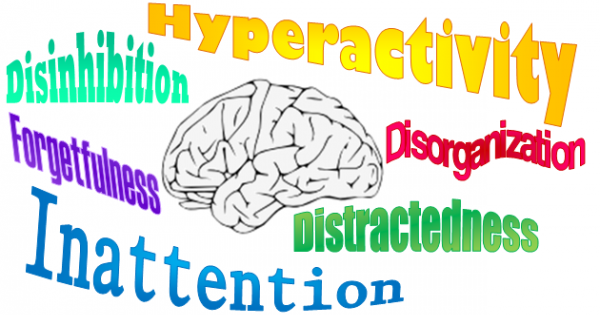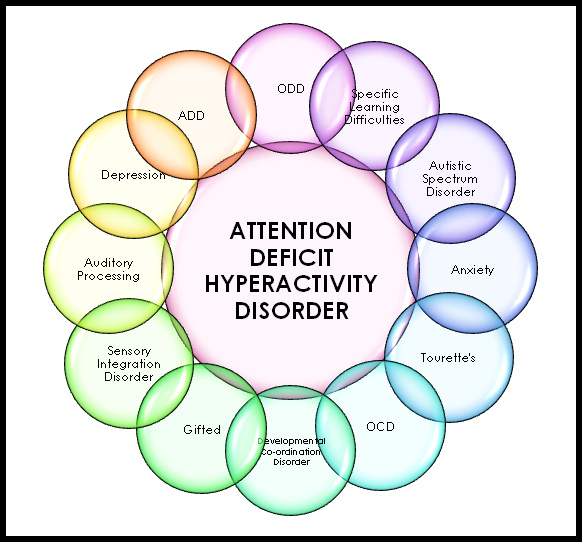
Alan: Adults with A.D.H.D. are in the unique position of having lived their entire lives -- from their formative years through adulthood -- without realizing that their view of reality is essentially skewed.
In effect, they grow into full adulthood thinking that their personal abnormality is normality.
As an A.D.H.D. adult, Trump has "bamboozled himself" for so long that it has become a threat to his essential identity to even consider the kind of fundamental re-form needed to incorporate a new behavioral compass.
Instead, Trump chooses to double down - and triple down - on convenient falsehoods, falsehoods that have always made his life "work," a life that is a resounding success in the eyes of millions.
I must add that Trump is an extreme case, but there are millions of others who suffer the same underlying affliction.
Instead, Trump chooses to double down - and triple down - on convenient falsehoods, falsehoods that have always made his life "work," a life that is a resounding success in the eyes of millions.
I must add that Trump is an extreme case, but there are millions of others who suffer the same underlying affliction.

In effect, adults with A.D.H.D. have tricked themselves, a circumstance that makes it doubly painful - and therefore doubly difficult - to acknowledge they've "been taken in."
To use Carl Sagan's term, once your own "inner charlatan" gets the upper hand, it's hard to reject "the bamboozle" whose component parts are so diverse and so inter-locking that it is nigh on impossible to accept ANY evidence of The Bamboozle.
To use Carl Sagan's term, once your own "inner charlatan" gets the upper hand, it's hard to reject "the bamboozle" whose component parts are so diverse and so inter-locking that it is nigh on impossible to accept ANY evidence of The Bamboozle.
Having heeded a "malfunctioning compass" since childhood, what are A.D.H.D. sufferers to do if it becomes apparent that they - through no fault of their own - have unwittingly betrayed themselves?
What are they to do should they realize in their adulthood that "it's not the other guy" who's fundamentally twisted; rather, it's their own subtle -- and by now -- totally rationalized, highly guarded "sense of self" whose mistaken standards have misguided them throughout life?
What are they to do should they realize in their adulthood that "it's not the other guy" who's fundamentally twisted; rather, it's their own subtle -- and by now -- totally rationalized, highly guarded "sense of self" whose mistaken standards have misguided them throughout life?
Fortunately there is Great Good News!
When A.D.H.D. is recognized and treated with broad spectrum "psycho-behavioral-pharmaceutical modalities," this syndrome is unusually amenable to successful treatment.
Indeed, the literature refers to "the good luck" of adult A.D.H.D. sufferers because their prognosis is uniquely favorable.
Still, the pre-requisite realization that one's life has been fundamentally misguided by "normalization of abnormality" is often a very painful hurdle to clear.
Still, the pre-requisite realization that one's life has been fundamentally misguided by "normalization of abnormality" is often a very painful hurdle to clear.
I have been in close relationship with a number of adult sufferers of A.D.H.D.
One of my afflicted friends regularly "reduced" me to "slackjaw incredulity" by his inability to entertain rudimentary truths, repeatedly mumbling at him, "You have serious trouble with truth my friend." Notably, I have never made this allegation with anyone else in my life. However, I make the same allegation (as you "probably" do) with Donald Trump.
One of my afflicted friends regularly "reduced" me to "slackjaw incredulity" by his inability to entertain rudimentary truths, repeatedly mumbling at him, "You have serious trouble with truth my friend." Notably, I have never made this allegation with anyone else in my life. However, I make the same allegation (as you "probably" do) with Donald Trump.
Very often, my friend would reply to my expressions of amazement, "I have no idea what you're talking about."
Eventually, I came to understand his puzzlement.
At bedrock, he and I lived in different epistemological worlds.
We literally spoke different languages, a kind of "nouveau Babel" in which the same written-and-spoken words meant radically different things to each of us.
And so it is that Christian conservatives see Trump as a salvific (if not messianic) figure, while the rest of us see him as a lying sonofabitch who actively indulges -- and promotes! -- a hubristic sort of self-certain self-interest exhibiting every "Deadly Sin" with the arguable exception of sloth. (Adult sufferers are not unusually prone to "sinfulness" although often - not always - they are quick to enter sexual relationships with "the wrong people.")
We literally spoke different languages, a kind of "nouveau Babel" in which the same written-and-spoken words meant radically different things to each of us.
And so it is that Christian conservatives see Trump as a salvific (if not messianic) figure, while the rest of us see him as a lying sonofabitch who actively indulges -- and promotes! -- a hubristic sort of self-certain self-interest exhibiting every "Deadly Sin" with the arguable exception of sloth. (Adult sufferers are not unusually prone to "sinfulness" although often - not always - they are quick to enter sexual relationships with "the wrong people.")
Eventually -- at age 50 -- my afflicted friend was formally diagnosed with A.D.H.D.
However, he approached his diagnosis as a "pharmaceutical issue," always taking care to stay clear of any psychological literature that might "flesh out" out his under-nourished "reality," and -- in the process -- discover "the dynamics" that had twisted his intimate relationships.
While writing this essay I am surprised to see how neatly Trump's core complex coincides with my friend's "presentation" of A.D.H.D. (I should mention that the potpouri of A.D.H.D. signs and symptoms can present with many different "blends" and "admixtures." The literature reports that A.D.H.D. in adults is accompanied by an unprecedentedly high number of "co-morbidities.")
In addition to their "trouble with truth," the core "quirk" that my friend shares with Trump is obsessive secretiveness and non-disclosure, a two-sided trait which is, ultimately, an attempt to keep their own secret from themselves - a ferocious determination to avoid disclosure by others for fear that such disclosure might reveal themselves to themselves.
There is, for example, no need for A.D.H.D. sufferers to ask whether they should be be involved in precipitous, "fly-by-night" highly-sexualized relationships.
Rather, what they require is that ill-advised sex partners not disclose what they know. A.D.H.D. sufferers are keeping a secret from themselves and therefore do what they can - with unconscisous "rectitude" - to promote non-disclosure.
Although it is widely-known that A.D.H.D. is fraught with "co-morbidities," the inter-related dis-ease that my attention-deficit friend shares most clearly with Trump is Oppositional Defiant Disorder which manifests as the combativeness that Trump exhibits every day by seeking a new hornet's nest to kick. Out of the blue, "any damn thing" will suddenly become an explosive, hot-headed issue.
With huge disproportionality, an A.D.H.D. sufferer's irrepressible energy is projected in uniformly self-justifying ways to find fault "out there" - never to locate fault in one's own misguided psyche or compulsive behaviors.
While writing this essay I am surprised to see how neatly Trump's core complex coincides with my friend's "presentation" of A.D.H.D. (I should mention that the potpouri of A.D.H.D. signs and symptoms can present with many different "blends" and "admixtures." The literature reports that A.D.H.D. in adults is accompanied by an unprecedentedly high number of "co-morbidities.")
In addition to their "trouble with truth," the core "quirk" that my friend shares with Trump is obsessive secretiveness and non-disclosure, a two-sided trait which is, ultimately, an attempt to keep their own secret from themselves - a ferocious determination to avoid disclosure by others for fear that such disclosure might reveal themselves to themselves.
There is, for example, no need for A.D.H.D. sufferers to ask whether they should be be involved in precipitous, "fly-by-night" highly-sexualized relationships.
Rather, what they require is that ill-advised sex partners not disclose what they know. A.D.H.D. sufferers are keeping a secret from themselves and therefore do what they can - with unconscisous "rectitude" - to promote non-disclosure.
"6 Dating Mistakes ADHD Adults Make"
Although it is widely-known that A.D.H.D. is fraught with "co-morbidities," the inter-related dis-ease that my attention-deficit friend shares most clearly with Trump is Oppositional Defiant Disorder which manifests as the combativeness that Trump exhibits every day by seeking a new hornet's nest to kick. Out of the blue, "any damn thing" will suddenly become an explosive, hot-headed issue.
With huge disproportionality, an A.D.H.D. sufferer's irrepressible energy is projected in uniformly self-justifying ways to find fault "out there" - never to locate fault in one's own misguided psyche or compulsive behaviors.
And so, refusing to "study" the "clinical presentation" of their dis-ease/syndrome/condition, Trump (like my afflicted friend) can safely prolong their customary behaviors, unusually convinced... passionately convinced... explosively convinced, that they are Absolutely Right when they project their own skewed views onto others.
According to their delusional convictions -- held from birth onward -- it is far better to limit their worldview to carefully edited, denied or even fabricated "facts and figures" than to undertake insight of therapy and the consequent disciplines of behavioral transformation.
And so, they shrink a fundamentally metaphysical matter to "a matter of matter" --- which is to say an essentially metaphysical issue is reduced to a physical one. "Surely, there must be a pill for that!"
For a brief while my A.D.H.D. friend was astonished at the improvement in her life when she started taking ritalin. But then, as is often true with people who start taking beneficial psych medications, he quit. (I suspect he quit in part because there was no enveloping, ongoing therapeutic milieu that provided support and continual reminder that his behavior was not normal.)
Does Donald Trump Have A.D.H.D.?For a brief while my A.D.H.D. friend was astonished at the improvement in her life when she started taking ritalin. But then, as is often true with people who start taking beneficial psych medications, he quit. (I suspect he quit in part because there was no enveloping, ongoing therapeutic milieu that provided support and continual reminder that his behavior was not normal.)
Kevin Drum
Mother Jones
Does Trump Have A.D.H.D.?
My Professional Opinion
Clinical Psychologist | Founder Sachs Center
Does Donald Trump Have A.D.H.D.?
Hyperactive-In-Chief: This Is The Presidency On A.D.H.D.
https://www.patheos.com/blogs/miraclegirl/2017/05/hyperactive-chief-presidency-adhd/
The A.D.H.D. Presidency
http://drbenmichaelis.com/the-adhd-president/
A Presidency On Drugs:
The Trump Administration Makes The News Cycle Feel Like A Bad Dose Of Amphetamines
The Nation
Could Donald Trump Have A.D.H.D.?
Donald Trump's A.D.H.D. Pours Cold Water On The Goldwater Rule

A.D.H.D. "Bibliography"
A.D.H.D. In Adults: The Full Scoop
An Excellent Compendium For Understanding The Breadth And Depth Of A.D.H.D. In Adults
A.D.H.D. In Adults: The Full Scoop
"Adults With ADHD Have Many Comorbidities," Journal Of The New England Journal Of Medicine
What To Do When Your Child Is A Bully
A.D.H.D. sufferers are four (4) times more likely to bully - and many times more likely to have multiple psychological issues - Oppositional Defiant Disorder and Depression among them.

A.D.H.D. In Adults: The Full Scoop
An Excellent Compendium For Understanding The Breadth And Depth Of A.D.H.D. In Adults

Alan: I believe the best single book about adult A.D.H.D. was written by Gina Pera whose husband, a high-functioning research scientist, nearly destroyed their relationship before Ms. Pera discovered what was going on and he agreed to treatment.
"Is It You, Me, or Adult A.D.D.? Stopping the Roller Coaster When Someone You Love Has Attention Deficit Disorder"
http://paxonbothhouses.blogspot.com/2017/12/when-someone-you-love-has-adhd.html
Alan: Although Pera makes clear that "Adult A.D.H.D." is a syndrome whose detrimental manifestations tend to ramify, she is equally clear that A.D.D. distills to the inability to "self-regulate."
N.B. Pera calls uses the acronym "A.D.D." in lieu of A.D.H.D. because often sufferers exhibit no observable hyperactive component.
N.B. Pera calls uses the acronym "A.D.D." in lieu of A.D.H.D. because often sufferers exhibit no observable hyperactive component.
In effect, an adult with A.D.D. never knew, at their core, what "normal" was, and therefore - in the absence of a shared understanding about consensus Reality, adult sufferers of the syndrome do not have an innate sense how to allign themselves with "standard norms."
And without "behavioral reflexes" based on consensus rules (from the Latin "regula"), they cannot "regulate" themselves.
And without "behavioral reflexes" based on consensus rules (from the Latin "regula"), they cannot "regulate" themselves.
However, those who suffer A.D.D. realize that something called "normalcy" does exist, and therefore, to compensate for their incomprehension, they establish very rigid "bumpers" along "the behavioral corridors" of life in order to "guess" where "normalcy" resides.
Once these "bumpers" are in place, their former inability to self-regulate is at least partially "overcome" by the imposition of "rules and regulations" which they can mechanically obey but whose reality they do not actually "feel."
PS Pera notes a revealing particular. With surprising regularity, people who are friends -- but not spouses -- of "adults with A.D.D." routinely believe that the NON-A.D.D. spouse (or intimate-other) is to blame for problems in the relationship.
It is inter-relatedly true that the spouse with A.D.D. is typically very solicitous of friends' welfare, an endearing characteristic. Plus, the A.D.D.-afflicted spouse's lack of self-regulation makes them charmingly quirky.
Complicating this curious inversion of views" is the way that the non-A.D.D. spouse's interaction with the afflicted spouse looks like the non-afflicted spouse is interacting with a child.
According to Pera, the non-A.D.D. spouse eventually gives way to his (or her) partner's continual irresponsibility (a manifestation of non-existent self-regulation) with the inevitable transformation of the A.D.D. sufferer into an irresponsible, contrary child who must be kept in line if the world's responsibilities -- bill-paying, vehicle inspection, meeting deadlines etcetera -- are to be met, and met in timely fashion.
One final comment...
Pera observes that A.D.D. adults are seldom hyperactive and for this reason she deletes the "H" in A.D.H.D.
What this means is that the adult sufferer of A.D.D. often developes a remarkable - and seemingly paradoxical ability - to "hyper-focus."
As adult sufferers of A.D.H.D. mature, they come to realize that they will be completely marginalized -- in their careers and in their intimate relationships -- unless they compensate for "attention deficit" which, by itself, leaves them too scatterbrained for focused achievement.
Consequently, many adults with A.D.D. undertake to compensate their scatteredness by becoming "hyper-focused."
Over time, these sufferers learn how to be unusually attentive to "work requirements" and "the development of romantic relationships," at least in the early stage of romance.
"6 Dating Mistakes ADHD Adults Make"
https://paxonbothhouses.blogspot.com/2018/10/6-dating-mistakes-adhd-adults-make.html
PS Pera notes a revealing particular. With surprising regularity, people who are friends -- but not spouses -- of "adults with A.D.D." routinely believe that the NON-A.D.D. spouse (or intimate-other) is to blame for problems in the relationship.
It is inter-relatedly true that the spouse with A.D.D. is typically very solicitous of friends' welfare, an endearing characteristic. Plus, the A.D.D.-afflicted spouse's lack of self-regulation makes them charmingly quirky.
Complicating this curious inversion of views" is the way that the non-A.D.D. spouse's interaction with the afflicted spouse looks like the non-afflicted spouse is interacting with a child.
According to Pera, the non-A.D.D. spouse eventually gives way to his (or her) partner's continual irresponsibility (a manifestation of non-existent self-regulation) with the inevitable transformation of the A.D.D. sufferer into an irresponsible, contrary child who must be kept in line if the world's responsibilities -- bill-paying, vehicle inspection, meeting deadlines etcetera -- are to be met, and met in timely fashion.
One final comment...
Pera observes that A.D.D. adults are seldom hyperactive and for this reason she deletes the "H" in A.D.H.D.
What this means is that the adult sufferer of A.D.D. often developes a remarkable - and seemingly paradoxical ability - to "hyper-focus."
As adult sufferers of A.D.H.D. mature, they come to realize that they will be completely marginalized -- in their careers and in their intimate relationships -- unless they compensate for "attention deficit" which, by itself, leaves them too scatterbrained for focused achievement.
Consequently, many adults with A.D.D. undertake to compensate their scatteredness by becoming "hyper-focused."
Over time, these sufferers learn how to be unusually attentive to "work requirements" and "the development of romantic relationships," at least in the early stage of romance.
"6 Dating Mistakes ADHD Adults Make"
https://paxonbothhouses.blogspot.com/2018/10/6-dating-mistakes-adhd-adults-make.html
Predictably, Donald Trump flits from romance to romance and this perpetual "novelty-newness" provides "fresh" titillation to keep him interested and focused long enough to develop the foundation of a relationship.
Later on, the novelty goes away and with the ensuing lack of stimulation, the A.D.D. "partner" loses interest and justifies that loss of interet by becoming hyper-focused on the shortcomings of the now-marginalized "love interest."
"The Coolidge Effect" addresses this phenomenon in a comical way. There's "an old joke about Calvin Coolidge when he was President … The President and Mrs. Coolidge were being shown [separately] around an experimental government farm. When [Mrs. Coolidge] came to the chicken yard she noticed that a rooster was mating very frequently. She asked the attendant how often that happened and was told, "Dozens of times each day." Mrs. Coolidge said, "Tell that to the President when he comes by." Upon being told, the President asked, "Same hen every time?" The reply was, "Oh, no, Mr. President, a different hen every time." President: "Tell that to Mrs. Coolidge."
https://en.wikipedia.org/wiki/Coolidge_effect
Later on, the novelty goes away and with the ensuing lack of stimulation, the A.D.D. "partner" loses interest and justifies that loss of interet by becoming hyper-focused on the shortcomings of the now-marginalized "love interest."
"The Coolidge Effect" addresses this phenomenon in a comical way. There's "an old joke about Calvin Coolidge when he was President … The President and Mrs. Coolidge were being shown [separately] around an experimental government farm. When [Mrs. Coolidge] came to the chicken yard she noticed that a rooster was mating very frequently. She asked the attendant how often that happened and was told, "Dozens of times each day." Mrs. Coolidge said, "Tell that to the President when he comes by." Upon being told, the President asked, "Same hen every time?" The reply was, "Oh, no, Mr. President, a different hen every time." President: "Tell that to Mrs. Coolidge."
https://en.wikipedia.org/wiki/Coolidge_effect
A.D.D. is complicated.
But A.D.D.'s entire profile fits Trump perfectly - even its paradoxical components.
Trump is scatter-brained but hyperfocused.
Notably, Trump's "evil genius" is ultimately rooted in his lifelong pattern of denying personal responsibility while doubling down, tripling down and quadrupling down on his own "innocence," making strident comparison of his "exoneration" while vituperating about the egregious shortcomings of his political opponents. Predictably, Trump perceives his "opponents" as existential "enemies" in order to induce-and-sustain enough motivation to compensate for his attention deficit.
This digression into "hyper-focus" brings us full circle.
At bedrock, the adult A.D.D. sufferer's core problem - and I should add that this "issue" does not always become a "problem" - is "self-regulation." (Sometimes the lack of self-regulation can be seen as "quaint," "candid," "charming" or "refreshing.")
Cheek-by-jowl with the absence of "self-regulation" is what Gina Pera calls the inability to "summon motivation” unless the sufferer does unusual (and frequently bizarre) things to force-feed motivation upon one's unmotivated self.
Without the forced motivation of anger, the A.D.D. sufferer often misses deadlines, fails to pay bills on time, does not "get the car inspected," is generally unable to maintain an orderly psychological-and-physical environment, and often comes across as "scatterbrained." (They are always losing things.)
In addition to launching sudden, ill-advised romantic relationships in order to appropriate the energy-intensive motivation of sex, anger is used as a common means for summoning motivation, especially in close relationships.
This anger is typified by several characteristics.
1.) In close relationship, an A.D.H.D. sufferer will suddenly become angry - and not infrequently, ragingly so.
2.) This anger comes "out of the blue," its intensity hugely disproportionate with the seeming triviality of the "identified" provocation - perhaps a sock left on the floor rather than getting tossed in the dirty clothes bin. Often, there seems to be no real rhyme-or-reason behind the sudden onset of rage.
3.) Indeed, in intimate relationship, anger can become such a dependable mechanism for "summoning motivation" that the person afflicted with A.D.H.D. makes anger a semi-permanent "backdrop" to his (or her) "special" relationship, thus ensuring that rage is always "accessible." And because it is "always" accessible, the person "on the receiving end" of that anger gets "psychologically pummeled" with such regularity that often these innocent victims "go crazy," even ending up with P.T.S.D. A.D.D. experts observe that unafflicted spouses sometimes call A.D.D. craziness a "communicable disease." Notably, friends of the couple that is "riding the A.D.D. roller coaster" often see the non-A.D.D. partner as the "crazy one" and therefore the probable cause of the relationship's dysfunction!?! (A.D.H.D. can be as weird - and seemingly inexplicable - as Trump himself.)
This digression into "hyper-focus" brings us full circle.
At bedrock, the adult A.D.D. sufferer's core problem - and I should add that this "issue" does not always become a "problem" - is "self-regulation." (Sometimes the lack of self-regulation can be seen as "quaint," "candid," "charming" or "refreshing.")
Cheek-by-jowl with the absence of "self-regulation" is what Gina Pera calls the inability to "summon motivation” unless the sufferer does unusual (and frequently bizarre) things to force-feed motivation upon one's unmotivated self.
Without the forced motivation of anger, the A.D.D. sufferer often misses deadlines, fails to pay bills on time, does not "get the car inspected," is generally unable to maintain an orderly psychological-and-physical environment, and often comes across as "scatterbrained." (They are always losing things.)
In addition to launching sudden, ill-advised romantic relationships in order to appropriate the energy-intensive motivation of sex, anger is used as a common means for summoning motivation, especially in close relationships.
This anger is typified by several characteristics.
1.) In close relationship, an A.D.H.D. sufferer will suddenly become angry - and not infrequently, ragingly so.
2.) This anger comes "out of the blue," its intensity hugely disproportionate with the seeming triviality of the "identified" provocation - perhaps a sock left on the floor rather than getting tossed in the dirty clothes bin. Often, there seems to be no real rhyme-or-reason behind the sudden onset of rage.
3.) Indeed, in intimate relationship, anger can become such a dependable mechanism for "summoning motivation" that the person afflicted with A.D.H.D. makes anger a semi-permanent "backdrop" to his (or her) "special" relationship, thus ensuring that rage is always "accessible." And because it is "always" accessible, the person "on the receiving end" of that anger gets "psychologically pummeled" with such regularity that often these innocent victims "go crazy," even ending up with P.T.S.D. A.D.D. experts observe that unafflicted spouses sometimes call A.D.D. craziness a "communicable disease." Notably, friends of the couple that is "riding the A.D.D. roller coaster" often see the non-A.D.D. partner as the "crazy one" and therefore the probable cause of the relationship's dysfunction!?! (A.D.H.D. can be as weird - and seemingly inexplicable - as Trump himself.)
To repeat...
I believe the best single book about adult A.D.H.D. was written by Gina Pera, whose husband, a high-functioning research scientist, nearly destroyed their relationship before Ms. Pera discovered what was taking place and he agreed to treatment.
No comments:
Post a Comment